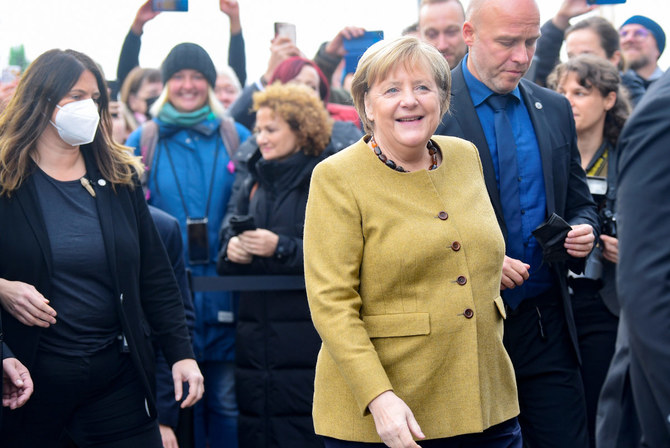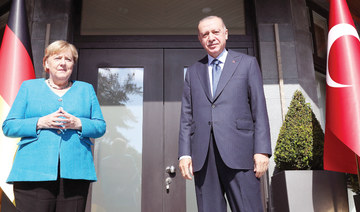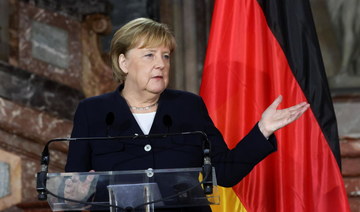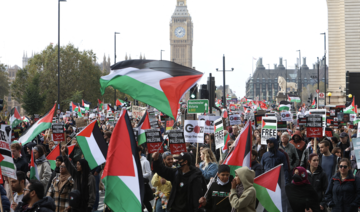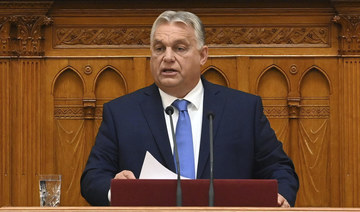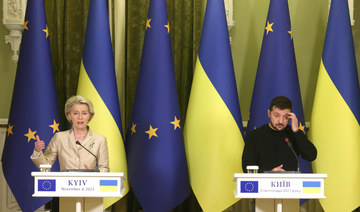BERLIN: Efforts by German parties to form a new government to succeed Angela Merkel’s coalition have run into hurdles, throwing their ambitious timetable to elect a new chancellor early next month into doubt.
Following the historic loss suffered by Merkel’s conservatives in September’s general election, the centre-left Social Democrats and their candidate Olaf Scholz came out in pole position to form the new ruling alliance.
But coalition talks with the ecologist Greens and the pro-business Free Democrats (FDP), which seemed to be progressing surprisingly quickly in early October, have grown fractious.
If the parties are unable to crack the toughest nuts by the end of the month, participants said the aim of seeing Scholz voted in as chancellor in the week of Dec. 6 could face significant delays.
“We can’t say yet when it (the coalition deal) will be ready because key issues are still up in the air,” Greens co-leader Annalena Baerbock told Berlin public radio on Friday, echoing complaints from other participants.
Investment in climate change, the future of mobility and the choice of who will be the next finance minister, who holds the purse strings of Europe’s top economy, have all emerged as sticking points.
Both Greens co-leader Robert Habeck and FDP chief Christian Lindner have staked a claim to the powerful ministry and appear not to be backing down even as the deadline inches closer.
FASTFACT
If the parties are unable to crack the toughest nuts by the end of the month, participants said the aim of seeing Scholz voted in as chancellor in the week of Dec. 6 could face significant delays.
Veteran Free Democrat Wolfgang Kubicki said that given his party’s profile of fiscal discipline, “anything else (besides the finance ministry) would be a slap in the face.”
At the heart of the dispute is financing for the Greens’ climate protection plans and efforts to lessen the impact of them on poorer households. They are calling for 50 billion euros ($58 billion) annually in investment.
The Greens have proposed new borrowing and tax hikes on top earners to pay for the measures they say are essential to Germany’s future, which are moves the FDP has ruled out.
FDP party leader Lindner, a budget hawk, gave a punchy interview Thursday to the conservative broadsheet Frankfurter Allgemeine Zeitung in which he fired several shots across the Greens’ bows.
“We’re talking about sustainable finances and policies to minimise the risk of inflation,” he said, warning that “in Germany, inflation risks are systematically played down.”
Leading Greens voiced frustration at a focus on short-term expense, arguing that the long-term costs of the climate crisis could be devastating.
Konstantin von Notz, a negotiator for the ecologist party, reached for a Titanic metaphor, setting a scene with two people standing on the bridge of the doomed ship.
“One says: ‘We should avoid the iceberg.’,” he tweeted. “And the other answers: ‘What will you give us for doing that.’”
National daily Sueddeutsche Zeitung said that putting together such a broad coalition was always going to be a challenge, particularly with the parties’ rank and file holding them to their campaign pledges.
“The Greens are feeling the pressure, as they were the ones who were keenest to get the FDP into this three-way coalition — details on how the Greens’ financing and climate targets could be achieved in government with the penny-pinching liberals would be agreed later, we were told,” it said.



